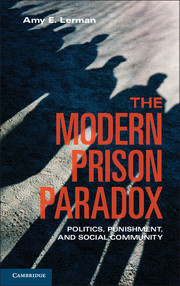Book contents
- Frontmatter
- Miscellaneous Frontmatter
- Contents
- Acknowledgments
- 1 The Modern Prison Paradox
- 2 Politics and the Punitive Turn
- 3 Public Policy and the Creation of Community
- 4 The Culture and Consequence of Prison
- 5 The Social Effects of Incarceration
- 6 The Social Effects of Prison Work
- 7 From Individuals to Communities
- 8 The Road to Reform
- 9 Epilogue (Or: How I Went to Berkeley and Wound Up in Prison)
- Appendixes
- Notes
- Index
3 - Public Policy and the Creation of Community
Published online by Cambridge University Press: 05 June 2014
- Frontmatter
- Miscellaneous Frontmatter
- Contents
- Acknowledgments
- 1 The Modern Prison Paradox
- 2 Politics and the Punitive Turn
- 3 Public Policy and the Creation of Community
- 4 The Culture and Consequence of Prison
- 5 The Social Effects of Incarceration
- 6 The Social Effects of Prison Work
- 7 From Individuals to Communities
- 8 The Road to Reform
- 9 Epilogue (Or: How I Went to Berkeley and Wound Up in Prison)
- Appendixes
- Notes
- Index
Summary
Neither a man nor a crowd nor a nation can be trusted to act humanely or to think sanely under the influence of great fear.
Bertrand Russell, An Outline of Intellectual Rubbish, Unpopular Essays (1950)The English philosopher Thomas Hobbes identified crime control as the primary motivation for the creation of an organized state. In Leviathan, Hobbes describes the state of nature as a place where competition for power abounds, and each individual views all others primarily as an obstacle to his own satisfaction. Thus, “war of all against all” is inevitable. In this dismal scenario, wherein life is “solitary, poor, nasty, brutish, and short,” people will willingly give up some measure of individual liberty in order to ensure their survival. For Hobbes, it is thus people’s desire for protection from robbery and violence that serves as a catalyst for the formation of government and justifies the subjugation of natural rights to a centralized authority that can enforce law and order.
In this conception of state power, government’s role as punisher is central, “because it is of the nature of punishment to have for end the disposing of men to obey the law.” Through punishment, the state provides for the collective peace and order that, in turn, allows individuals to enjoy their freedoms. Punishment must therefore be severe enough to have a “contrary effect” rather than simply being viewed by the public as the (acceptable) cost of crime.
- Type
- Chapter
- Information
- The Modern Prison ParadoxPolitics, Punishment, and Social Community, pp. 44 - 67Publisher: Cambridge University PressPrint publication year: 2013



